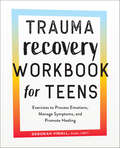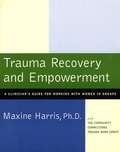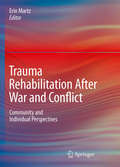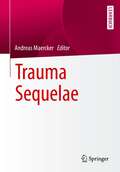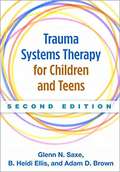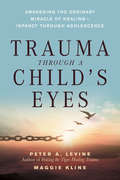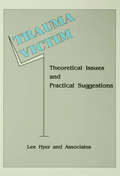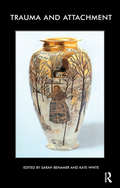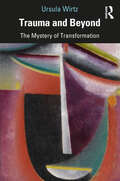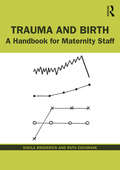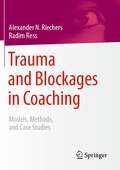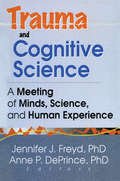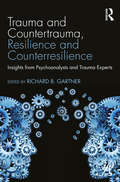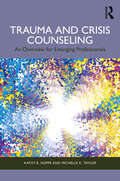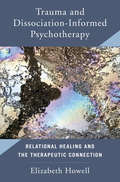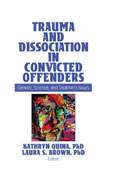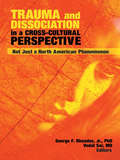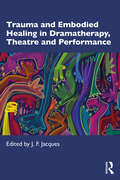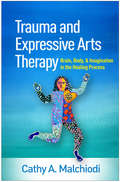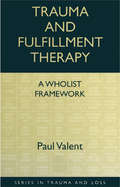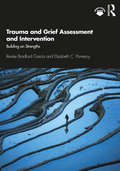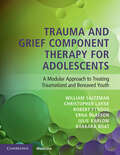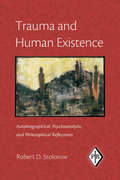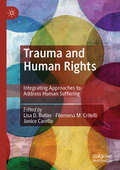- Table View
- List View
Trauma Recovery Workbook for Teens: Exercises to Process Emotions, Manage Symptoms, and Promote Healing
by Deborah VinallHelp teens recover from trauma and look forward to the futureThe 2022 Best Book Award winner in Young Adult Nonfiction, AmericanBookFest.com.Experiencing trauma and grief—especially at a young age—can make it a challenge to feel excited about everything that life has to offer. The Trauma Recovery Workbook for Teens shows kids ages 12 to 16 that healing is possible, offering a trauma treatment toolbox that encourages them to identify their emotions, embrace resiliency, and find a renewed sense of hope and happiness.The truth about trauma—This trauma workbook for teens clearly explains different types of trauma—from political upheaval to childhood trauma, and sexual abuse—so teens can understand where their feelings come from.Strategies for healing—Let teens take action with activities for trauma and recovery like meditation, spotting potential triggers, tracking their thoughts, and more.Feeling seen—Teens will find comfort and reassurance through stories and questions inspired by other teens who have also experienced trauma.This trauma-informed mental health book gives teens an effective way to work through the past and strengthen their sense of self.
Trauma Recovery and Empowerment: A Clinician's Guide For Working With Women in Groups
by Maxine HarrisThis one-of-a-kind guide serves as a rich and essential resource for mental health professionals working with women whose lives have been shattered by the trauma of sexual, physical, or emotional abuse. The book presents a practical, step-by-step guide to implementing a group recovery program for female trauma survivors.
Trauma Rehabilitation After War and Conflict
by Erin Martz"As foreign assistance flows into post-conflict regions to rebuild economies, roads, and schools, it is important that development professionals retain a focus on the purely human element of rebuilding lives and societies. This book provides perspective on just how to begin that process so that the trauma people suffered is not passed on to future generations long after the violence has stopped." - Amy T. Wilson, Ph.D., Gallaudet University, Washington, DC "This ground-breaking text provides the reader with an excellent and comprehensive overview of the existing field of trauma rehabilitation. It also masterfully navigates the intricate relationships among theory, research, and practice leaving the reader with immense appreciation for its subject matter." - Hanoch Livneh, Hanoch Livneh, Ph.D., LPC, CRC, Portland State University Fear, terror, helplessness, rage: for soldier and civilian alike, the psychological costs of war are staggering. And for those traumatized by chronic armed conflict, healing, recovery, and closure can seem like impossible goals. Demonstrating wide-ranging knowledge of the vulnerabilities and resilience of war survivors, the collaborators on Trauma Rehabilitation after War and Conflict analyze successful rehabilitative processes and intervention programs in conflict-affected areas of the world. Its dual focus on individual and community healing builds on the concept of the protective "trauma membrane," a component crucial to coping and healing, to humanitarian efforts (though one which is often passed over in favor of rebuilding infrastructure), and to promoting and sustaining peace. The book's multiple perspectives--including public health, community-based systems, and trauma-focused approaches--reflect the complex psychological, social, and emotional stresses faced by survivors, to provide authoritative information on salient topics such as: Psychological rehabilitation of U.S. veterans, non-Western ex-combatants, and civilians Forgiveness and social reconciliation after armed conflict Psychosocial adjustment in the post-war setting Helping individuals heal from war-related rape The psychological impact on prisoners of war Rehabilitating the child soldier Rehabilitation after War and Conflict lucidly sets out the terms for the next stage of humanitarian work, making it essential reading for researchers and professionals in psychology, social work, rehabilitation, counseling, and public health.
Trauma Sequelae
by Andreas MaerckerExperiences of violence, sexual abuse, accidents, disasters or deaths of close relatives or friends, and other extreme situations can lead to trauma-related disorders. Since 2018, the World Health Organization has distinguished four such disorders in its classification list: "classic" and complex post-traumatic stress disorder, as well as prolonged grief disorder and adjustment disorder. These long-term effects are described in detail in the book. In recent years, a variety of interventions have been developed to effectively treat these disorders. This 5th edition has been largely reorganized due to the groundbreaking innovations in which the editor played a decisive role on an international level. Among the innovations are the chapters on: - Complex post-traumatic stress disorder - Childhood violence and its consequences - Low-threshold and innovative interventions - Methods of cognitive behavioral therapy - Psychodynamic approaches The handbook on psychological trauma-related disorders.
Trauma Systems Therapy for Children and Teens
by Adam D. Brown Glenn N. Saxe B. Heidi EllisThis highly practical book has helped thousands of clinicians make the most of limited resources to support children and families struggling with chronic, multiple adversities. Trauma systems therapy (TST) is grounded in cutting-edge research on traumatic stress and child development. It provides a roadmap for integrating individualized treatment with services at the home, school, and community levels. Effective assessment and intervention strategies are accompanied by vivid case material and reproducible worksheets and forms.
Trauma Through a Child's Eyes: Awakening the Ordinary Miracle of Healing
by Peter A. Levine Ph.D. Maggie KlineWhat parents, educators, and health professionals can do to recognize, prevent, and heal childhood trauma, from infancy through adolescence—by the author of Waking the TigerTrauma can result not only from catastrophic events such as abuse, violence, or loss of loved ones, but from natural disasters and everyday incidents like auto accidents, medical procedures, divorce, or even falling off a bicycle. At the core of this book is the understanding of how trauma is imprinted on the body, brain, and spirit—often resulting in anxiety, nightmares, depression, physical illnesses, addictions, hyperactivity, and aggression. Rich with case studies and hands-on activities, Trauma Through a Child&’s Eyes gives insight into children&’s innate ability to rebound with the appropriate support, and provides their caregivers with tools to overcome and prevent trauma.&“Trauma Through A Child&’s Eyes . . . creates its own mold in a way that everyone concerned with the health and happiness of children will be grateful for.&” —Gabor Maté, MD, author of Hold On to Your Kids
Trauma Victim: Theoretical Issues And Practical Suggestions
by Lee HyerAiming to fulfill the need for a multifaceted approach to post-traumatic stress disorder (PTSD), this guide addresses the importance of the stressor, places paramount the person of the victim and provides treatment procedures. The 11 authors weave a care paradigm that begins with a position: the persona of the victim organises and preserves his or her reality and the trauma makes this more so. The book provides a formula for accepting, understanding and treating the individual and helps the therapist inspect and nurture the trauma victim's self and ego skills.
Trauma and Attachment (The Bowlby Centre Monograph Series)
by Kate White Sarah BenamerThis monograph contains a rich variety of material that is not usually included in traditional writings on trauma. In addition to the theoretical and clinical perspectives, poetry and storytelling join in to weave a vivid tapestry of multifaceted approaches to trauma. Whilst remaining true to its theoretical base (which, of course, is Bowlby's attachment theory), the monograph succeeds in locating its subject matter in wider perspectives, thus enabling the reader to appreciate the complexity of contributing factors. It is not easy to compile a single publication out of a conference; yet, this monograph achieves its objective by offering a coherent treatment of trauma that also includes some up-to-date approaches and innovations. The papers are written with authority, clarity and sensitivity and will provide the reader with a most beneficial elaboration of trauma from an attachment theory perspective.
Trauma and Beyond: The Mystery of Transformation
by Ursula WirtzIn this seminal work on the clinical, archetypal and spiritual dimension of trauma, the author offers a compelling vision of the transformative potential of suffering and the dialectic of Dying and Becoming. Wirtz outlines a healing path from fragmentation to integration and illuminates the resilience of the human spirit in the face of severe trauma. Trauma and Beyond will be essential reading and a valuable resource for counsellors, therapists and Jungian analysts who are challenged in their practice with individual and collective traumata.
Trauma and Birth: A Handbook for Maternity Staff
by Sheila Broderick Ruth CochraneOur book aims to provide those working in the maternity services, including those in general practices, with an understanding of what it means to be on the receiving end of care. Together with a description of various types of traumatic birth, we explain some of the reasons why women vary in terms of how traumatised they are by their birth experience. We provide information, encouragement and support for maternity staff to help them lessen the incidence of birth trauma, and to develop the confidence to help women when birth trauma does occur. The authors are a senior counsellor and an obstetrician, each with a long experience of helping women who have had difficult births. The approach of each to the subject is different but complementary. The book covers the psychological and emotional aspects of traumatic birth as well as the medical issues and includes a section on the effect of traumatic birth on the staff themselves. The market for this book is practising midwives and obstetricians, who by understanding the prevalence of traumatic birth and some of its causes can contribute to its reduction. Those in their training years will find it helpful at the outset of their practice. It will also be of interest to general practitioners, health visitors and counsellors.
Trauma and Blockages in Coaching: Models, Methods, and Case Studies
by Radim Ress Alexander N. RiechersBlockages to be solved with coaching are often the result of repressed traumatic experiences of a person or their ancestors. Pictorial models will guide the reader into the multi-layered landscape of the soul and its principles. Along the way, the book decodes traumas as the soul’s fundamental building blocks and follows them back to their origins: existential limit-experiences and their common denominator, the splitting of the soul. The consequences of this autonomous survival mechanism affect all areas of life, starting from the unconscious. Therefore, they are not accessible by conventional methods working with the conscious mind. The presented integrative approach provides means and ways that significantly expand the potential of coaching.
Trauma and Cognitive Science: A Meeting of Minds, Science, and Human Experience
by Jennifer J Freyd Anne P DeprinceDecipher the complex interplay of neurology, psychology, trauma, and memory!In the midst of the controversies over how repressed, false, and recovered memories should be interpreted, Trauma and Cognitive Science presents reliable original research instead of rhetoric. This landmark volume examines the way different traumas influence memory, information processing, and suggestibility. The research provides testable theories on why people forget some kinds of childhood abuse and other traumas. It bridges the cognitive science and clinical approaches to traumatic stress studies.Written by the foremost researchers in the field, including Bessel van der Kolk and Jennifer Freyd, these scientific evaluations of the way traumatic memories are processed offer powerful new perspectives on the interplay of biology and psychology. Trauma and Cognitive Science discusses a range of traumas, including combat, child abuse, and sexual assault across the lifespan. Fascinating perceptual experiments shed light on the cognitive uses of dissociation, the encoding and recall of memory, and the effects of early trauma on subsequent information processing. Trauma and Cognitive Science offers solid information on the most challenging questions in this field: How is memory encoded, stored, and retrieved? How is it forgotten? How does trauma influence these processes? What kinds of memories can be created by suggestion? What physical changes take place in the brain under traumatic stress? How is consciousness disturbed during and after trauma? What are the ethical, clinical, and societal implications of traumatic stress studies? How can people suffering from traumatic memories be healed? Trauma and Cognitive Science also offers an astonishing array of true case studies, including the story of an adult woman who was raped, went to court, and saw her rapist convicted--and then forgot the whole traumatic episode. The independently corroborated accounts of recovered memories and the carefully designed research studies on multiple modes and levels of memory may offer the key to understanding how we remember and why we forget. The results of these controlled scientific studies have wide-ranging implications for abuse survivors, combat veterans, rape victims, and people who have survived traumatic events from earthquakes to car accidents. Written in clear, accessible prose, Trauma and Cognitive Science belongs on the bookshelf of all mental health professionals, researchers in the areas of traumatic stress and child abuse, attorneys, judges, and survivors of abuse and trauma.
Trauma and Countertrauma, Resilience and Counterresilience: Insights from Psychoanalysts and Trauma Experts (Psychoanalysis in a New Key Book Series)
by Richard GartnerTreating traumatized patients takes its toll on the treating clinician, giving rise over time to what Richard B. Gartner terms countertrauma in the psychoanalyst or therapist. Paradoxically, a clinician may also be imbued with a sense of optimism, or counterresilience, after learning how often the human spirit can triumph over heartbreakingly tragic experiences. Trauma and Countertrauma, Resilience and Counterresilience brings together a distinguished group of seasoned clinicians, both trauma specialists and psychoanalysts. Their personal reflections show what clinicians all too rarely dare to reveal: their personal traumatic material. They then discuss how they develop models for acknowledging, articulating, and synthesizing the countertrauma that arises from long-term exposure to patients’ often-harrowing trauma. Writing openly, using viscerally affecting language, the contributors to this exceptional collection share subjective and sometimes intimate material, shedding light on the inner lives of people who work to heal the wounds of psychic trauma. By the same token, many of these clinicians describe how working intimately with traumatized individuals can affect the listener positively, recounting how patients’ resilience evokes counterresilience in the therapist, allowing the clinician to benefit from ongoing contact with patients who deal bravely with horrific adversity. Paradoxically, a clinician may be imbued with a sense of optimism after learning how often the human spirit can triumph over heartbreakingly tragic experiences. Trauma and Countertrauma, Resilience and Counterresilience will appeal to psychoanalysts, psychoanalytic psychotherapists, and trauma experts, offering a valuable resource to those beginning their careers in mental health work, to teachers and supervisors of trauma therapists, to experienced clinicians struggling with burnout, and to anyone who wants to understand the psychotherapeutic process or indeed the human condition.
Trauma and Crisis Counseling: An Overview for Emerging Professionals
by Kathy B. Hoppe Michelle K. TaylorTrauma and Crisis Counseling: An Overview for Emerging Professionals is an introduction to trauma for students, new counselors, and other helping professionals. The book provides a sweeping overview of trauma from more than 500 sources. It includes definitions, a clear exploration of trauma’s neurobiology, information on assessment and diagnosis, and summaries of the primary models of evidence-based treatments.The text also addresses suicidality, crisis, and disasters, as well as the challenges faced in providing care to people who experience trauma. Throughout the book, the authors focus on what it means to be trauma-informed and how to integrate resiliency in trauma work. The material is presented in a conversational way using case studies, examples, and practical activities to enhance the reader’s learning.Trauma and Crisis Counseling lays the foundation for effective trauma work in a readable format.
Trauma and Dissociation Informed Psychotherapy: Relational Healing And The Therapeutic Connection
by Elizabeth HowellA fresh look at the importance of dissociation in understanding trauma. A new model of therapeutic action, one that heals trauma and dissociation, is overtaking the mental health field. It is not just trauma, but the dissociation of the self, that causes emotional pain and difficulties in functioning. This book discusses how people are universally subject to trauma, what trauma is, and how to understand and work with normative as well as extreme dissociation. In this new model, the client and the practitioner are both traumatized and flawed human beings who affect each other in the mutual process that promotes the healing of the client—psychotherapy. Elizabeth Howell explains the dissociative, relational, and attachment reasons that people blame and punish themselves. She covers the difference between repression and dissociation, and how Freud’s exclusive focus on repression and the one-person fantasy Oedipal model impeded recognition of the serious consequences of external trauma, including child abuse. The book synthesizes trauma/dissociation perspectives and addresses new structural models.
Trauma and Dissociation in Convicted Offenders: Gender, Science, and Treatment Issues
by Laura S. Brown Kathryn QuinaBetter understand the men and women most affected by trauma in our society Convicted offenders quite often are found to have a history of trauma. Trauma and Dissociation in Convicted Offenders: Gender, Science, and Treatment Issues provides a comprehensive look at the connection between complex trauma and the likelihood of being a convicted offender. This unique text focuses on what factors increase the likelihood of being a convicted offender, and what treatment possibilities lay ahead for these individuals. Substance abuse, childhood sexual abuse, and other traumatic experiences and their links to incarcerated men and women are discussed in detail. Interventions and research within the corrections system are examined, with recommendations on how to better serve this population. Trauma and Dissociation in Convicted Offenders: Gender, Science, and Treatment Issues takes a reasoned stand on women and men in prison, understanding that while they are being punished for breaking the law, they also are survivors of trauma whose dysfunctions underscore the need for greater understanding and more research. This valuable source presents the most current research results while providing a clear view on important future directions of study and focus. Each chapter of this insightful resource is extensively referenced and many have tables to clearly present data. Topics in Trauma and Dissociation in Convicted Offenders: Gender, Science, and Treatment Issues include: the relationship between post-traumatic stress and lifetime substance abuse among incarcerated women research on women inmates with HIV sexual risk and hazardous drinking behavior study on the link between trauma and women domestic violence offenders dissociation and memory in sex abusers the &’re-criminalization&’ of mental illness the effectiveness of group therapy for incarcerated women survivors of childhood sexual abuse (CSA) challenges, ethical issues, and benefits of conducting research with abuse survivors in a women's prison facility Trauma and Dissociation in Convicted Offenders: Gender, Science, and Treatment Issues is an essential resource for clinicians, educators, students, policymakers, and researchers.
Trauma and Dissociation in a Cross-Cultural Perspective: Not Just a North American Phenomenon
by George F. Rhoades Vedat SarAn international look at the similarities and differences of long-lasting traumaTrauma and Dissociation in a Cross-Cultural Perspective examines the psychological, sociological, political, economic, and cultural aspects of trauma and its consequences on people around the world. Dispelling the myth that trauma-related dissociative disorders are a North American phenomenon, this unique book travels through more than a dozen countries to analyze the effects of long-lasting traumatization-both natural and man-made-on adults and children. Working from theoretical and clinical perspectives, the field&’s leading experts address trauma in situations that range from the psychological effects of "the Troubles" in Northern Ireland to the emergence of "Hikikomori," the phenomenon of social withdrawal in Japanese youth.Reactions to trauma can be both unique according to a person&’s culture and similar to the experiences of others around the world. Dissociation, intense grief, anger, and survivor&’s guilt are common responses as people split off mentally, physically, and emotionally from the source of the trauma, whether it&’s an act of nature (tsunami, earthquake, flood, etc.) or the trauma created by violence, physical, sexual, and emotional abuse, assault, confinement, kidnapping, and war. Trauma and Dissociation in a Cross-Cultural Perspective examines the efforts of clinicians and researchers in Europe, Asia, the Middle East, South America, Australia, and New Zealand to develop sociopsychological methods of providing counseling to people who are suffering physically, emotionally and spiritually, training for professionals counted on to dispense that counseling, and economic and political solutions that might help to limit the devastating effects of natural disasters. Trauma and Dissociation in a Cross-Cultural Perspective examines: the tensions between the National Health Service and the private sector in the United Kingdom how the Mandarin version of the Dissociative Experiences Scale (DES) is used in China Djinnai, a culture-bound syndrome and possession trance disorder found in Iran how colonialism has transmitted trauma to the Maori people of New Zealand transgenerational trauma in Turkey religious rituals and spirit possession in the Philippines "memory wars" in Israel traumatic syndromes among the French differences in dissociative experiences among Chinese and Japanese youth childhood trauma in Argentina and much moreTrauma and Dissociation in a Cross-Cultural Perspective is an enlightening professional resource for anyone working in psychology, sociology, psychiatry, and psychotherapy.
Trauma and Embodied Healing in Dramatherapy, Theatre and Performance
by J. F. JacquesThis edited volume explores the singularity of embodiment and somatic approaches in the healing of trauma from a dramatherapy, theatre and performance perspective.Collating voices from across the fields of dramatherapy, theatre and performance, this book examines how different interdisciplinary and intercultural approaches offer unique and unexplored perspectives on the body as a medium for the exploration, expression and resolution of chronic, acute and complex trauma as well as collective and intergenerational trauma. The diverse chapters highlight how the intersection between dramatherapy and body-based approaches in theatre and performance offers additional opportunities to explore and understand the creative, expressive and imaginative capacity of the body, and its application to the healing of trauma.The book will be of particular interest to dramatherapists and other creative and expressive arts therapists. It will also appeal to counsellors, psychotherapists, psychologists and theatre scholars.
Trauma and Expressive Arts Therapy: Brain, Body, and Imagination in the Healing Process
by Cathy A. MalchiodiFrom pioneering therapist Cathy A. Malchiodi, this book synthesizes the breadth of research on trauma and the brain and presents an innovative framework for treating trauma through the expressive arts. The volume describes powerful ways to tap into deeply felt bodily and sensory experiences as a foundation for safely exploring emotions, memories, and personal narratives. Rich clinical examples illustrate the use of movement, sound, play, art, and drama with children and adults. Malchiodi's approach not only enables survivors to express experiences that defy verbalization, but also helps them to transform and integrate the trauma, regain a sense of aliveness, and imagine a new future. Purchasers get access to a companion website where they can download and print reproducible tools from the book in a convenient 8 1/2" x 11" size, as well as full-color versions of 26 figures.
Trauma and Forgiveness
by C. Fred AlfordContrary to the view of trauma popularized by literary theorists, Trauma and Forgiveness argues that the traumatized are capable of representing their experience and that we should therefore listen more and theorize less. Using stories and case studies, including testimonies from Holocaust survivors, as well as the victims of 'ordinary' trauma, C. Fred Alford shows that, while the traumatized are generally capable of representing their experience, this does little to heal them. He draws on the British Object Relations tradition in psychoanalysis to argue that forgiveness, which might be expected to help heal the traumatized, is generally an attempt to avoid the hard work of mourning losses that can never be made whole. Forgiveness is better seen as a virtue in the classical sense, a recognition of human vulnerability. The book concludes with an extended case study of the essayist Jean Amery and his refusal to forgive.
Trauma and Fulfillment Therapy: Pathways to Fulfillment (Series in Trauma and Loss)
by Paul ValentFirst Published in 1999. Routledge is an imprint of Taylor & Francis, an informa company.
Trauma and Grief Assessment and Intervention: Building on Strengths
by Elizabeth C. Pomeroy Renée Bradford GarciaWith clarity and eloquence, Trauma and Grief Assessment and Intervention comprehensively captures the nuance and complexity involved in counseling bereaved and traumatically bereaved persons in all stages of the life cycle. Integrating the various models of grief with the authors’strengths-based framework of grief and loss, chapters combine the latest research in evidence-based practice with expertise derived from years of psychotherapy with grieving individuals. The book walks readers through the main theories of grief counseling, from rapport building to assessment to intervention. Each chapter concludes with lengthy case scenarios that closely resemble actual counseling sessions to help readers apply their understanding of the chapter’s content. In the support material on the book’s website, instructors will find a sample syllabus, PowerPoint slides, and lists of resources that can be used as student assignments or to enhance classroom learning. Trauma and Grief Assessment and Intervention equips students with the knowledge and skills they need to work effectively with clients experiencing trauma and loss.
Trauma and Grief Component Therapy for Adolescents
by William Saltzman Christopher M. Layne Robert Pynoos Erna Olafson Julie Kaplow Barbara BoatDeveloped by experts in trauma psychiatry and psychology and grounded in adolescent developmental theory, this is a modular, assessment-driven treatment that addresses the needs of adolescents facing trauma, bereavement, and accompanying developmental disruption. Created by the developers of the University of California, Los Angeles PTSD Reaction Index#65533; and the Persistent Complex Bereavement Disorder Checklist, the book links clinicians with cutting-edge research in traumatic stress and bereavement, as well as ongoing training opportunities. This innovative guide offers teen-friendly coping skills, handouts, and specialized therapeutic exercises to reduce distress and promote adaptive developmental progression. Sessions can be flexibly tailored for group or individual treatment modalities; school-based, community mental health, or private practice settings; and different timeframes and specific client needs. Drawing on multidimensional grief theory, it offers a valuable toolkit for psychologists, psychiatrists, counsellors, and others who work with bereaved and traumatized adolescents. Engaging multicultural illustrations and extensive field-testing give this user-friendly manual international appeal.
Trauma and Human Existence: Autobiographical, Psychoanalytic, and Philosophical Reflections (Psychoanalytic Inquiry Book Series #Vol. 23)
by Robert D. StolorowTrauma and Human Existence effectively interweaves two themes central to emotional trauma - the first pertains to the contextuality of emotional life in general, and of the experience of emotional trauma in particular, and the second pertains to the recognition that the possibility of emotional trauma is built into the basic constitution of human existence. This volume traces how both themes interconnect, largely as they crystallize in the author’s personal experience of traumatic loss. As discussed in the book's final chapter, whether or not this constitutive possibility will be brought lastingly into the foreground of our experiential world depends on the relational contexts in which we live. Taken as a whole, Trauma and Human Existence exhibits the unity of the deeply personal, the theoretical, and the philosophical in the understanding of emotional trauma and the place it occupies in human existence.
Trauma and Human Rights: Integrating Approaches to Address Human Suffering
by Lisa D. Butler Filomena M. Critelli Janice CarelloHuman rights violations and traumatic events often comingle in victims’ experiences; however, the human rights framework and trauma theory are rarely deployed together to illuminate such experiences. This edited volume explores the intersection of trauma and human rights by presenting the development and current status of each of these frameworks, examining traumatic experiences and human rights violations across a range of populations and describing efforts to remediate them. Individual chapters address these topics among Native Americans, African Americans, children, women, lesbian/gay/bisexual/transgender individuals, those with mental disabilities, refugees and asylees, and older adults, and also in the context of social policy and truth and reconciliation commissions. The authors demonstrate that the trauma and human rights frameworks each contribute invaluable and complementary insights, and that their integration can help us fully appreciate and address human suffering at both individual and collective levels.
